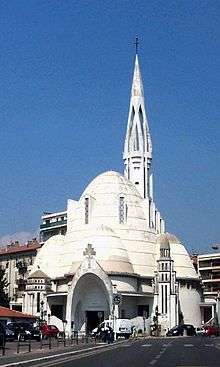Sainte Jeanne d'Arc, Nice
| Church of Saint Joan of Arc Sainte Jeanne d'Arc (French) | |
|---|---|
 Façade of the church | |
| Basic information | |
| Location | Nice, France |
| Geographic coordinates | 43°42′48.28″N 7°15′45.36″E / 43.7134111°N 7.2626000°ECoordinates: 43°42′48.28″N 7°15′45.36″E / 43.7134111°N 7.2626000°E |
| Affiliation | Roman Catholic |
| District | Diocese of Nice |
| Province | Archdiocese of Marseille |
| Ecclesiastical or organizational status | Parish church |
| Heritage designation | 1992 |
| Leadership | P. Guy Largillière[1] |
| Website |
nice |
| Architectural description | |
| Architect(s) | Louis Castel, Jacques Droz |
| Architectural type | Church |
| Architectural style | Art deco |
| Groundbreaking | 1914 (crypt) |
| Completed | 1934[2] |
| Specifications | |
| Length | 59 m (194 ft)[2] |
| Width | 43 m (141 ft)[2] |
| Height (max) |
Nave: 25 m (82 ft)[2] |
| Materials | Reinforced concrete |
| Official name: Église Sainte-Jeanne d'Arc | |
| Designated | 12 June 1992 |
| Reference no. | PA00080940[3] |
| Denomination | Église |
The Church of Saint Joan of Arc (French: Sainte Jeanne d'Arc) is a Roman Catholic parish church located in Nice, France. Noticeable for its original architecture, the church is dedicated to Joan of Arc.
The style of this church is controversial among the inhabitants of Nice, judged ugly by some. The church is sometime nicknamed "the Meringue" for its white color.
History
In 1914, Father Quillery was appointed parish priest of the new parish of Saint Jérome. The first projects for a new church are proposed. French architect Louis Castel initiated in 1914 its construction and built a crypt. After World War I, another French architect Jacques Droz constructed in 1924 a second crypt.[2] Both crypts are the support of the new building. In 1931 a concrete basement is laid over the two crypts.[2] Between 1932 and 1934, the church was built using reinforced concrete. Droz employed the technique of the thin shell concrete for the domes that have a thickness of 45 centimetres (18 in) at the base but only 8 centimetres (3.1 in) at the top.[2]
Architecture
The use of reinforced concrete, a new material at that time, allowed an original construction in a style influenced by Art Deco. Eight ellipsoidal domes support three larger ovoid domes. In the interior, these three large domes are only supported by four pillars, which allows an astonishing interior volume with 25 metres (82 ft) high vaults.[2] The angular form of the 64 metres (210 ft)[2] steeple is in opposition with the strong curves of the domes.
The 95 m2 (1,020 sq ft) fresco paintings of the stations of the Cross were executed by Eugène Klementieff in 1934.[2] The paintings are influenced by Russian Cubism, Italian Quattrocento and Byzantine Orthodox icons.[2]
References
- Citations
- Bibliography
- Thévenon, Luc (1997). Eglises et Art-Déco à Nice : modernité et résistances (in French). Nice: Serre. ISBN 978-2-86410-271-7.
- "Monument historique - PA00080940". Mérimée database of Monuments Historiques (in French). France: Ministère de la Culture. 1992. Retrieved 17 July 2011.
External links
- Joan of Arc Church at Structurae. Retrieved on 17 July 2011.
- Sainte Jeanne d'Arc Church with NiceRendezVous (in French)
- Nice-rendezvous (in English)
![]() Media related to Église Sainte-Jeanne-d'Arc de Nice at Wikimedia Commons
Media related to Église Sainte-Jeanne-d'Arc de Nice at Wikimedia Commons